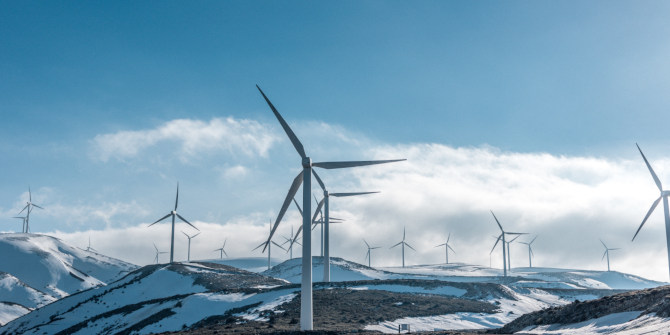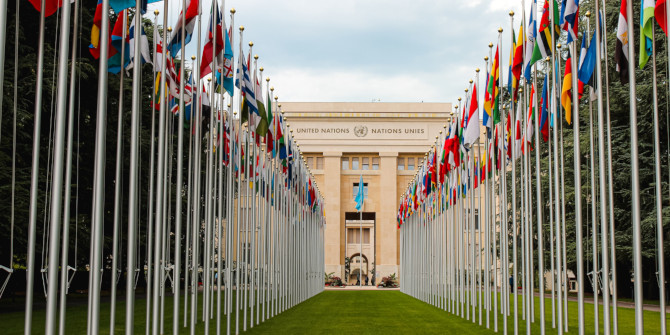The EU has established a Just Transition Fund to help support regions and sectors that face socio-economic challenges during the transition to climate neutrality. Anna Kyriazi and Joan Miró explain how the fund came to be adopted and its role in highlighting the social policy implications of pursuing a green transition.
Climate change poses the greatest existential threat to organised human existence. Tackling it requires urgent and wide-ranging social and political change. However, deep decarbonisation can only be viable and legitimate if it is socially fair. In other words, it cannot (only) constitute an additional burden for workers, households, and consumers, but rather it should be an opportunity to generate shared and inclusive prosperity.
In 2019 the European Commission launched the European Green Deal, envisaging nearly 50 initiatives to ensure the green transition. Acknowledging that efforts to tackle climate change need to be socially legitimate, the Green Deal aims to assuage some of the painful social consequences of the transition by creating a Just Transition Fund (JTF) and a Social Climate Fund. While the first will channel €17.5 billion to the regions and sectors most affected by decarbonisation, the second, still in its first legislative steps and with a proposed €72.2 billion capacity, aims to tame the detrimental distributional effects of the new EU Emissions Trading Scheme. Both instruments will be operative until 2027.
As we argue in a new study, the Just Transition Fund is an intriguing innovation that highlights the limits and possibilities of the current politics of climate change. Adding a social dimension to the energy transition is not a given and history provides examples of environmentally beneficial but socially regressive transitions. Indeed, when in 2018 the EU set its climate objectives for 2030, little consideration was given to social policy implications. At the same time, redistributive instruments are rarely adopted in the EU due to their politically charged character. How, then, did the Just Transition Fund come to be?
Agenda-setting
No social condition, however important or severe, automatically becomes a political problem without being constructed as such by actors pursuing certain interests and goals. Additionally, the issue of climate change is especially hard to recognise as an urgent political problem because of its slow and cumulative character and therefore it is likely to generate policy procrastination.
Despite this, a major change occurred in 2018-19, driven mainly by the persistent and massive mobilisation of civil society actors. Three social movements stand out in particular: Extinction Rebellion, the Yellow Vests in France, and the youth movement Fridays for Future. The three movements, very different in their social bases, claims and actions, highlighted different aspects of the climate challenge emergency, but their joint effect was to call unprecedented attention to it.
At the time, European publics were also increasingly turning their attention to climate related issues as well as becoming more supportive of the EU taking the lead in solving such problems. It is also worth remembering that 2019 was the year of the European Parliament elections, when Green parties increased their vote share compared to 2014. The incoming Commission led by Ursula von der Leyen was seeking a new political programme and legitimating narrative, which it found in the ambitious project of the Green New Deal.
The first explicit demand for a fund to assuage some of the painful consequences of the energy transition came in 2018 from a highly influential conservative Polish politician, Jerzy Buzek. The idea was for this fund to focus on coal regions and thus to be a targeted measure for Eastern and Central European states which are more reliant on coal and tend to have weaker economies than other member states. During 2019, the proposal reappeared in discussions regarding the EU’s long-term climate objectives, as Eastern European actors demanded financial assistance to be able to implement these objectives. In this context, the potential for a trade-off arose: climate laggards would sign off on the objectives in exchange for compensation funds.
Nevertheless, the June 2019 European Council failed to agree on a landmark climate strategy for 2050, as the leaders of the Czech Republic, Estonia, Hungary, Poland, and Romania continued to oppose it, demanding detailed pledges for funds for the countries undergoing the transition. Other member states, such as Spain, which had already undertaken substantial energy transitions in the preceding years, were wary about the idea of paying others for their decarbonisation when they had received no such support beforehand.
The negotiations
At this point, the incoming von der Leyen Commission took up the Just Transition Fund and set out to build a renewed policy proposal on the just transition idea, which would be less transparently self-serving from a Polish perspective and thus able to garner wider support.
During the legislative process, the Commission sought to reconcile the divergent demands of the member states without losing sight of the key objective: obtaining consensus on the EU’s goal to become climate neutral by 2050. This was a delicate balancing act. While bringing European Green Deal sceptics closer to the desired agreement on climate neutrality, the Commission’s strategy risked alienating others, especially as the debate on the Just Transition Fund became enmeshed in the negotiations over the next EU budget. The ensuing discussions regarding the Just Transition Fund came to be organised around four main lines of contention: the size of the fund, its conditionality, its position towards fossil fuels and nuclear energy, and the weight of its social component.
The outbreak of the Covid-19 pandemic in Europe in March 2020 led to an overhaul of EU budget discussions, including those on the Just Transition Fund. While in the early stages of the pandemic some ideas were floated that the European Green Deal should be delayed or even scrapped, the EU institutions pushed forward with the Commission, increasing, even, the Just Transition Fund’s proposed budget.
In the final design of the Just Transition Fund, the greener and more socially sensitive positions prevailed over the more ‘hawkish’ ones. However, as Mehtap Akgüç and her colleagues have pointed out, the Just Transition Fund, and the broader ‘just transition framework’ so far developed by the EU, falls short of the needs required to ensure a fair transition towards climate neutrality.
A socially fair green transition
In this sense, the Just Transition Fund’s primary relevance lies in incorporating in the public debate on the green transition the need to be sensitive to its redistributive implications across regions and classes. Rather than establishing a comprehensive and sufficient response to the problem, its likely contribution will be to reveal just how large the social policy implications of the green transition are.
However, even for this small policy step to be possible, numerous conditions needed to converge in EU politics, chief among them the powerful protest cycle in 2018-2019, which was especially influential in directing the attention of policymakers to the issue.
Subsequently, while the need to publicly finance just transition policies re-emerged in relation to some Eastern European states’ reluctance to work towards the 2050 climate neutrality target, the von der Leyen Commission took over the task of pushing through the proposal by building sufficient majorities for it. More coalitions of ‘strange bedfellows’ like this will be needed to further push decarbonisation policies in the near future.
For more information, see the authors’ accompanying study in Comparative European Politics
Note: This article gives the views of the authors, not the position of EUROPP – European Politics and Policy or the London School of Economics. Featured image credit: Karsten Würth on Unsplash





